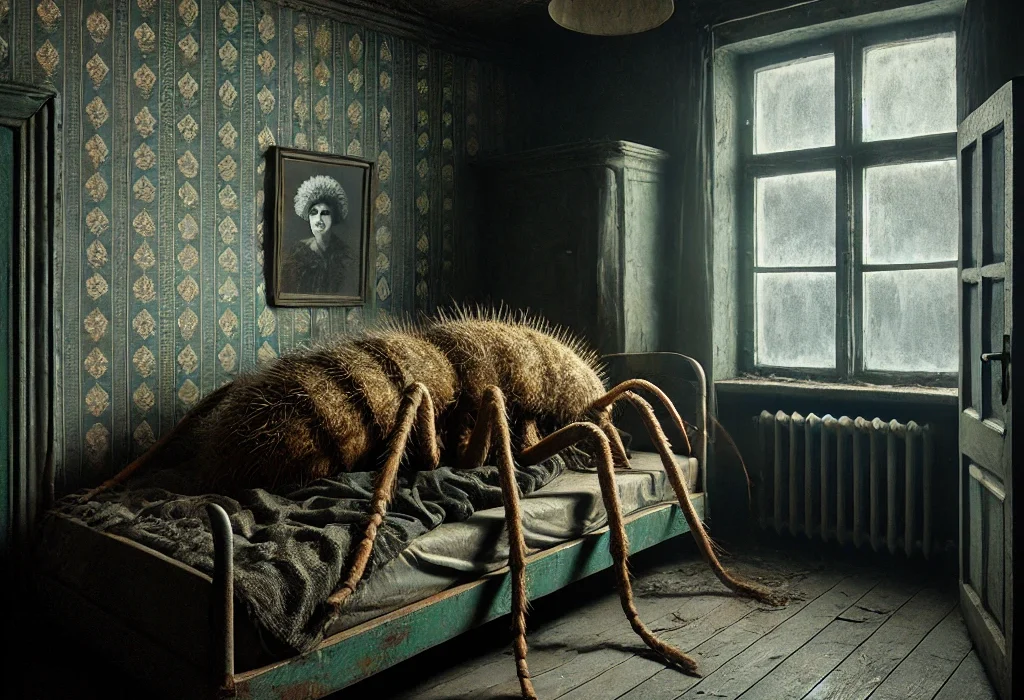“The Metamorphosis” by Franz Kafka, first published in 1915, is a profound novella that explores themes of alienation, identity, and the absurdity of life. Set in an unspecified city, the story delves into the bizarre transformation of the protagonist, Gregor Samsa, who wakes up one morning to find himself transformed into a monstrous insect. The narrative unfolds in a surreal, kafkaesque style, portraying the impacts of this transformation on Gregor and his family.
Comprehensive Plot Summary
One morning, Gregor Samsa woke up from unsettling dreams to find himself transformed into a gigantic insect. Lying on his hard, shell-like back, he struggled to comprehend his new condition. His room, filled with familiar objects, now felt strange and confining. Gregor’s initial thoughts were practical; he worried about missing his train and being late for work. As a traveling salesman, he was the sole breadwinner for his family, a role he took seriously despite its hardships.
As Gregor grappled with his new body, he tried to get out of bed but found it incredibly difficult. His numerous, thin legs flailed helplessly. His mother, father, and sister Grete, unaware of his transformation, knocked on his door, concerned about his unusual tardiness. Gregor’s attempts to respond only produced unintelligible squeaks. The family became increasingly anxious, and soon, his office’s chief clerk arrived to check on him.
Desperate to prove he wasn’t shirking his responsibilities, Gregor managed to unlock his door with great difficulty, using his mouth to turn the key. When the door finally swung open, his appearance shocked everyone. His mother fainted, the chief clerk fled in terror, and his father drove him back into his room with a cane and a rolled-up newspaper, wounding Gregor in the process.
Confined to his room, Gregor’s life changed drastically. His sister Grete, initially the only family member who dared to enter his room, brought him food. However, Gregor’s tastes had changed; he now preferred rotten food to fresh. Grete’s care, though initially compassionate, became increasingly perfunctory and resentful as the days passed.
Gregor’s family struggled to cope with their new reality. His father, who had been in ill health and out of work, took a job as a bank messenger. His mother took on sewing to contribute to the household income. Grete, who once seemed destined for a brighter future, sacrificed her aspirations and took a job as a salesgirl. The family’s financial situation forced them to make further changes, including renting out a room to three boarders.
As Gregor’s condition deteriorated, so did the family’s patience and compassion. The once-vibrant bond between them frayed under the strain of their new circumstances. One evening, Grete played her violin for the boarders, and Gregor, drawn by the music, ventured out of his room. His presence horrified the boarders, who threatened to leave without paying rent. This incident became a turning point for Grete, who declared that they must get rid of Gregor, referring to him as a mere insect and not her brother.
Heartbroken and weakened, Gregor retreated to his room. The family, now resolute in their decision, stopped feeding him. Left alone and neglected, Gregor succumbed to his injuries and starvation. His lifeless body was discovered the next morning by the cleaning woman, who disposed of it without ceremony.
With Gregor’s death, the oppressive atmosphere lifted from the household. The family members experienced a sense of relief and newfound freedom. They decided to move to a smaller apartment, one they could afford without Gregor’s income. In the final scene, they took a stroll together, contemplating a hopeful future, with Grete’s parents planning to find her a suitable husband.
Gregor’s life had become a series of silent sufferings. His family, who once depended on him, now viewed him as a burden. The isolation of his room mirrored his emotional isolation. His attempts to communicate were met with fear and revulsion, emphasizing the profound disconnect between his inner world and the outer reality.
In the quiet of his confinement, Gregor’s thoughts often wandered to his past. He remembered the days when his family looked at him with pride and relied on his earnings to maintain their comfortable lifestyle. Those days felt like a distant memory now, overshadowed by his current grotesque existence.
His sister Grete, who had initially shown some sympathy, gradually distanced herself. The sight of Gregor’s insect form became too much for her to bear. She hurried through her visits, leaving food without attempting to communicate. Her youthful dreams of attending the conservatory to pursue her love for music had been replaced by the harsh realities of their new life.
The transformation had not only changed Gregor but also revealed the true nature of his family’s relationships. His father’s return to work was marked by bitterness and resentment. The man who once loafed around the house now walked with a cane, a symbol of his regained authority. His mother’s health deteriorated as she took on the additional burden of sewing to support the family.
As the days turned into weeks, Gregor’s physical condition worsened. His injuries from his father’s violent outburst left him in constant pain. He struggled to move around his room, his once strong body now a fragile shell. Despite his misery, he clung to the hope that his family would come to understand and accept him.
The final blow came when the family decided to rent out a room to three boarders. Gregor was completely isolated, his existence reduced to a secret shame. The boarders, with their disdainful looks and loud complaints, made it clear that there was no place for Gregor in his own home.
One evening, drawn by the sound of Grete’s violin, Gregor ventured out of his room. The music, a haunting reminder of happier times, pulled him towards the living room. But the boarders’ horrified reaction and Grete’s harsh words shattered any remnants of hope he had left.
In the aftermath of that fateful evening, Gregor’s family made a collective decision. Grete, once his closest ally, now saw him as a threat to their survival. Her declaration that they must get rid of him marked the end of any familial bond.
Gregor, sensing the finality of their decision, retreated to his room for the last time. His body, weakened by neglect and despair, could no longer sustain him. As he lay in the dark, his thoughts grew quieter, his once frantic movements stilled. In the early morning hours, Gregor Samsa, the dutiful son and brother, succumbed to his fate.
When the cleaning woman discovered his body, she disposed of it with a casual indifference that reflected the family’s relief. Gregor’s death marked a new beginning for them. The oppressive gloom that had settled over their lives lifted, and they began to make plans for the future.
Mr. and Mrs. Samsa, along with Grete, decided to move to a smaller, more affordable apartment. As they walked through the city, the weight of their past seemed to lighten. Grete, no longer burdened by the responsibility of caring for her transformed brother, blossomed into a young woman with new possibilities ahead of her. Her parents, now free from the fear of financial ruin, looked forward to a brighter future.
In the end, Gregor’s sacrifice went unacknowledged by the very people he had devoted his life to. His tragic transformation and ultimate demise served as a stark reminder of the fragile nature of human connections and the often harsh realities of familial duty. The Samsa family, having endured their own metamorphosis, stepped into the future with a renewed sense of hope, leaving Gregor’s memory to fade into obscurity.
Main Characters
- Gregor Samsa: A traveling salesman who transforms into a giant insect. His sense of duty to his family drives him, but his transformation isolates him and ultimately leads to his demise.
- Grete Samsa: Gregor’s sister, who initially cares for him but grows resentful and eventually advocates for his removal. Her transformation from a caring sibling to a pragmatic young woman reflects the family’s shifting dynamics.
- Mr. Samsa: Gregor’s father, who struggles with pride and frustration. He returns to work after Gregor’s transformation, displaying both his resilience and his harshness.
- Mrs. Samsa: Gregor’s mother, who is torn between her love for her son and her horror at his condition. Her health deteriorates as she grapples with the family’s challenges.
Themes and Motifs
- Alienation: Gregor’s transformation physically manifests his emotional and social alienation. He is cut off from his family, his job, and the world he once knew.
- Identity: The story explores the fragility of identity. Gregor’s sense of self is eroded as he becomes more insect-like, losing his human characteristics and connections.
- Absurdity: Kafka’s depiction of Gregor’s inexplicable transformation and the family’s reaction highlights the absurdity of existence and the often irrational nature of human responses to crises.
- Family Duty and Sacrifice: Gregor’s sense of duty towards his family and their subsequent sacrifices depict the complex dynamics of familial responsibility and the burdens it can impose.
Writing Style and Tone
Kafka’s writing style in “The Metamorphosis” is marked by its precision, clarity, and a matter-of-fact tone that contrasts sharply with the bizarre and surreal events of the story. His use of simple, straightforward language to describe Gregor’s grotesque transformation and the family’s mundane reactions creates a dissonance that enhances the novella’s unsettling atmosphere. Kafka employs a third-person limited perspective, focusing closely on Gregor’s thoughts and experiences, which amplifies the sense of isolation and alienation felt by the protagonist.
The tone of the novella is deeply melancholic and reflective, infused with a sense of existential dread. Kafka’s narrative evokes sympathy for Gregor while also critiquing the societal and familial structures that contribute to his misery. The understated horror and bleakness of Gregor’s situation are conveyed through Kafka’s subtle and restrained prose, making the reader acutely aware of the tragic absurdity of his plight.
If this summary has sparked your interest, we would appreciate you subscribing to our newsletter.
There’s a treasure trove of other fascinating book summaries waiting for you. Check out our collection of stories that inspire, thrill, and provoke thought, just like this one by clicking here.
If you want to request a book summary, click here.
When Saurabh is not working/watching movies/reading books/traveling, you can reach him via Twitter/X, or LinkedIn.
Restart reading!






